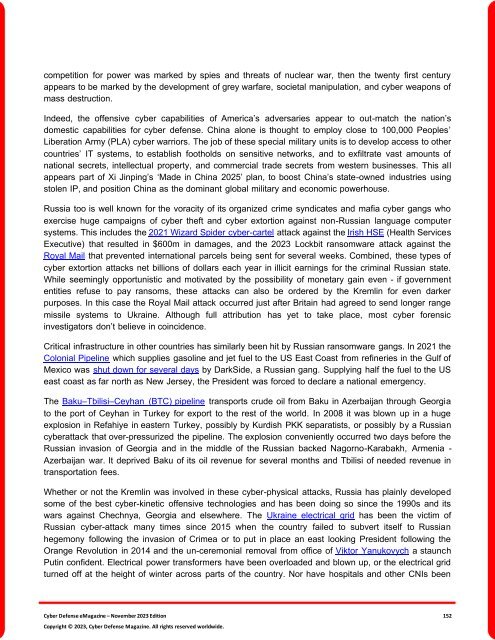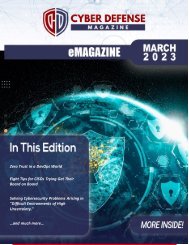The Cyber Defense eMagazine November Edition for 2023
Cyber Defense eMagazine November Edition for 2023 #CDM #CYBERDEFENSEMAG @CyberDefenseMag by @Miliefsky a world-renowned cyber security expert and the Publisher of Cyber Defense Magazine as part of the Cyber Defense Media Group as well as Yan Ross, Editor-in-Chief and many more writers, partners and supporters who make this an awesome publication! 196 page November Edition fully packed with some of our best content. Thank you all and to our readers! OSINT ROCKS! #CDM #CDMG #OSINT #CYBERSECURITY #INFOSEC #BEST #PRACTICES #TIPS #TECHNIQUES
Cyber Defense eMagazine November Edition for 2023 #CDM #CYBERDEFENSEMAG @CyberDefenseMag by @Miliefsky a world-renowned cyber security expert and the Publisher of Cyber Defense Magazine as part of the Cyber Defense Media Group as well as Yan Ross, Editor-in-Chief and many more writers, partners and supporters who make this an awesome publication! 196 page November Edition fully packed with some of our best content. Thank you all and to our readers! OSINT ROCKS! #CDM #CDMG #OSINT #CYBERSECURITY #INFOSEC #BEST #PRACTICES #TIPS #TECHNIQUES
Create successful ePaper yourself
Turn your PDF publications into a flip-book with our unique Google optimized e-Paper software.
competition <strong>for</strong> power was marked by spies and threats of nuclear war, then the twenty first century<br />
appears to be marked by the development of grey warfare, societal manipulation, and cyber weapons of<br />
mass destruction.<br />
Indeed, the offensive cyber capabilities of America’s adversaries appear to out-match the nation’s<br />
domestic capabilities <strong>for</strong> cyber defense. China alone is thought to employ close to 100,000 Peoples’<br />
Liberation Army (PLA) cyber warriors. <strong>The</strong> job of these special military units is to develop access to other<br />
countries’ IT systems, to establish footholds on sensitive networks, and to exfiltrate vast amounts of<br />
national secrets, intellectual property, and commercial trade secrets from western businesses. This all<br />
appears part of Xi Jinping’s ‘Made in China 2025’ plan, to boost China’s state-owned industries using<br />
stolen IP, and position China as the dominant global military and economic powerhouse.<br />
Russia too is well known <strong>for</strong> the voracity of its organized crime syndicates and mafia cyber gangs who<br />
exercise huge campaigns of cyber theft and cyber extortion against non-Russian language computer<br />
systems. This includes the 2021 Wizard Spider cyber-cartel attack against the Irish HSE (Health Services<br />
Executive) that resulted in $600m in damages, and the <strong>2023</strong> Lockbit ransomware attack against the<br />
Royal Mail that prevented international parcels being sent <strong>for</strong> several weeks. Combined, these types of<br />
cyber extortion attacks net billions of dollars each year in illicit earnings <strong>for</strong> the criminal Russian state.<br />
While seemingly opportunistic and motivated by the possibility of monetary gain even - if government<br />
entities refuse to pay ransoms, these attacks can also be ordered by the Kremlin <strong>for</strong> even darker<br />
purposes. In this case the Royal Mail attack occurred just after Britain had agreed to send longer range<br />
missile systems to Ukraine. Although full attribution has yet to take place, most cyber <strong>for</strong>ensic<br />
investigators don’t believe in coincidence.<br />
Critical infrastructure in other countries has similarly been hit by Russian ransomware gangs. In 2021 the<br />
Colonial Pipeline which supplies gasoline and jet fuel to the US East Coast from refineries in the Gulf of<br />
Mexico was shut down <strong>for</strong> several days by DarkSide, a Russian gang. Supplying half the fuel to the US<br />
east coast as far north as New Jersey, the President was <strong>for</strong>ced to declare a national emergency.<br />
<strong>The</strong> Baku–Tbilisi–Ceyhan (BTC) pipeline transports crude oil from Baku in Azerbaijan through Georgia<br />
to the port of Ceyhan in Turkey <strong>for</strong> export to the rest of the world. In 2008 it was blown up in a huge<br />
explosion in Refahiye in eastern Turkey, possibly by Kurdish PKK separatists, or possibly by a Russian<br />
cyberattack that over-pressurized the pipeline. <strong>The</strong> explosion conveniently occurred two days be<strong>for</strong>e the<br />
Russian invasion of Georgia and in the middle of the Russian backed Nagorno-Karabakh, Armenia -<br />
Azerbaijan war. It deprived Baku of its oil revenue <strong>for</strong> several months and Tbilisi of needed revenue in<br />
transportation fees.<br />
Whether or not the Kremlin was involved in these cyber-physical attacks, Russia has plainly developed<br />
some of the best cyber-kinetic offensive technologies and has been doing so since the 1990s and its<br />
wars against Chechnya, Georgia and elsewhere. <strong>The</strong> Ukraine electrical grid has been the victim of<br />
Russian cyber-attack many times since 2015 when the country failed to subvert itself to Russian<br />
hegemony following the invasion of Crimea or to put in place an east looking President following the<br />
Orange Revolution in 2014 and the un-ceremonial removal from office of Viktor Yanukovych a staunch<br />
Putin confident. Electrical power trans<strong>for</strong>mers have been overloaded and blown up, or the electrical grid<br />
turned off at the height of winter across parts of the country. Nor have hospitals and other CNIs been<br />
<strong>Cyber</strong> <strong>Defense</strong> <strong>eMagazine</strong> – <strong>November</strong> <strong>2023</strong> <strong>Edition</strong> 152<br />
Copyright © <strong>2023</strong>, <strong>Cyber</strong> <strong>Defense</strong> Magazine. All rights reserved worldwide.

















